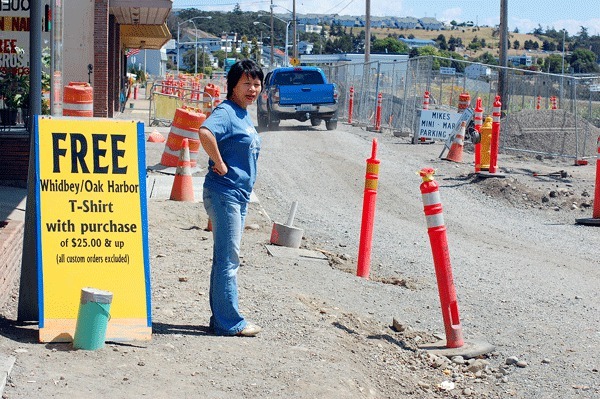Oak Harbor received good news this week when it learned that state regulators had green lighted archeological work on SE Pioneer Way.
The permit to begin the work was issued by the state Department of Archeology and Historic Preservation late Thursday afternoon. It’s a big deal because it means construction on the city’s $8.35-million road project can resume soon.
“Best case scenario is a week from Monday,” Oak Harbor Mayor Jim Slowik said.
The remains of four Native Americans were unearthed on the street this past June. By order of the state office, all work on the road project was halted about six weeks ago pending the issuance of the archeological permit.
It establishes where and what type of digging will need to occur to determine the scope of the find; whether it’s just a few graves, a larger burial ground, or the remains of a more significant site such as a long-gone village.
The permit is loaded with conditions and stipulations. Before construction can resume in any area, exploratory digging will need to be done. In places where work is already finished, such as the street between City Beach and Ireland streets, it will be performed in places such as holes left in sidewalks for landscaping.
Obviously, more extensive digging will take place at the actual find site in front of Mike’s Mini Mart. According to Eric Johnston, city engineer, the work is expected to begin next week and will take from two to three weeks to complete.
Some of the conditions were discussed in a meeting Tuesday involving city officials, and historic preservation office officials and representatives of six Western Washington tribes. One of the issues hammered out concerned the hiring of tribal archeologists and monitors.
Some tribes had requested their own people be on hand during the archeological work. Following the meeting, which lasted several hours, Samish Tribal Chairman Tom Wooten confirmed that a consensus among the tribes had been reached.
Along with the city’s hired specialist, one tribal archeologist and one tribal monitor would represent all their interests.
The bones are “pre-contact so it’s all our ancestors,” Wooten said.
He also confirmed that the cost of the experts would be an expense covered by the city. However, he could not say how much it may run.
Allyson Brooks, director for the state historic preservation office, said the city is also being required to create a cultural resource management plan. It will determine how the city will approach any future construction work performed on Pioneer Way in years to come.
“We’re very supportive of that,” Johnston said.
The creation of the document will be a public process, with public review and final approval by the city council, he said.
Although it’s not a requirement of the permit, Brooks said it was suggested a plan be created for the entire city, as past finds indicate the area is rich in cultural resources. Johnston said it’s something that is under consideration.
City officials met with the project contractor, Strider Construction, on Thursday. Johnston said they are preparing a new construction schedule and have begun the process of remobilizing. But revving up the construction motor back to full throttle will take some time.
“Getting back into the full swing of things … it will take a couple weeks,” he said.
Even if everything goes right and work begins soon, Johnston said he doubted the project will be wrapped up by its planned Sept. 2 deadline. However, he did say he was confident it would be done before the end of the year.
Before construction resumes, Strider crews will need to undergo some required training. According to Brooks, it will focus primarily on things like how to spot cultural resources and a review of applicable state laws.
Finally, the city will have to create a reburial plan but the details will largely be made between the city and the tribes. Slowik said some decisions concerning the matter have already been made.
“They are going to stay here and (the tribes) have asked the city to come up with a suitable site,” he said.
The exact location will probably have to be kept secret, in accordance with state law, but it will likely be very near to Pioneer Way, Slowik said.



